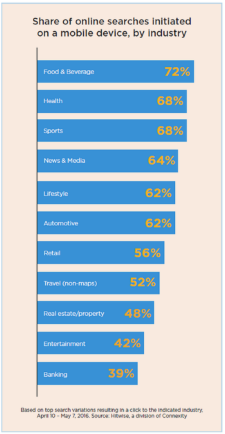“Alright! Real estate agents around Las Vegas,” said the pleasant Google lady that answers my voice questions from my smartphone. She sounds just like Alexa, doesn’t she?
I was wondering how she’d respond if I said “Ok, Google, I need a real estate agent around Las Vegas.”
And, no, I’m not really selling (if I were, I’d hire you, I promise), so don’t start spamming me.
This little experiment was the result of a couple of articles I read last night. All of them said that real estate voice search will be HUGE this year and everybody better get ready for this relatively new tech.
Smartphones to smart homes – Real estate voice search is here

The author of one piece said that 62 percent of Google’s search traffic is initiated on a mobile device. I’m sure you’ll agree, that’s pretty impressive.
The article went on to say that because of that hecka impressive number, all real estate professionals should start scrambling to optimize all of their content and images for real estate voice search.
But, like you, I never just take someone’s word for something and, especially in this case, since my first thought when I read that was: “62 percent of searches for what?
I would be very impressed and over the moon thrilled if all those people were searching for freelance writers as you would be the same if those searches were for real estate agents in your town.
It turns out that neither of our professions is mentioned in the surveys I read. There were “real estate/property” searches and 48 percent of them come from mobile devices.

Source: hitwise.connexity.com
Now, of those mobile device searches, 12 percent are done via voice.
(And, my everlasting thanks goes to Rebecca Sentance at Econsultancy.com for doing the math on this one for us.)
Twelve percent sounds puny, doesn’t it? Numerically, though, it works out to 50.4 million searches.
But these statistics are from 2016. What’s happening now with voice tech that’s getting everyone so hot to get on board the real estate voice search bandwagon?
Glad you asked
In late 2017, only 13 percent of U.S. wi-fi -enabled households had smart speakers. Three months later, in February 2018, that share had jumped to 20 percent (nearly 19 million homes), according to Susan Engleson, senior director of emerging products at ComScore.com.
Adoption of smart speakers is expected to increase another 7 percent this year, by the way.
Smart home technologists have been saying for years that broad adoption of smart speakers and other connected tech would happen when prices went more mainstream. We’ve now hit that point.
But that tells us nothing about whether or not Joe, fixing dinner for the kids, is asking Alexa to interrupt the music he requested to find him a real estate agent.
The question I kept reading is “Are you ready for voice search?”
Why isn’t Google ready for real estate voice search?
Real estate voice search results are as hit-and-miss (often worse) as those for typed searches.
For instance, I asked the Google lady to “show me houses for sale in my neighborhood” and she returned only four results. Three guesses which sites they were.
In his early-2016 goodbye-to-Google letter, Amit Singhal sang the praises of the Google algo that he worked so diligently on improving.
“When I started, who would have imagined that in a short period of 15 years, we would tap a button, ask Google anything and get the answer?”
Gosh, Amit, who would’ve expected that the answer seems to come from the mind of a 5-year old who ranks anything sparkly and shiny numero uno – even when that “something” is dung, wrapped in aluminum foil?
In its present form, according to Sentance, real estate voice search is a bit of a one-hit wonder, a ‘single search result’ tool which is mostly useful for . . . questions that have a definitive answer.”
Such as “yes” or “no.”
Since Bing copies basically everything Google does, according to Sentance, the future of voice search just might be (but she hopes not) “Everybody optimize for single search results; the future of search will be one answer!”
Which, in reality, is pretty much what it is right now. As we’ve seen, when forced to produce a list, Google voice search gets it all kinds of wrong.
But it won’t be like that forever, most likely

You may be hearing a lot about the coupling of real estate marketing with voice search this year. There is, in fact, already a company devoted to taking yet more of your dollars for their service: An “Intelligent Personal Assistant, like Siri, but exclusively for the real estate industry.”
Don’t take your eye off of this year’s goals to jump on the bandwagon, though, and don’t feel pressured.
Like Sentance and other skeptics, I believe that it’s well worth it to optimize for real estate voice search, but there’s no rush. When you’re tooling around the backend of your website, consider optimizing your images. Start with that.
Before I go, I had one more question for Google
“Hey Google,” I asked. “What is the most accurate real estate website?”
“Here are your results,” she answered.
“From Student Loan Hero.”
Well, heck, if Student Loan Hero says it, it must be true, right?
I wasn’t aware that StudentLoanHero.com was so well-versed in real estate so naturally I visited.
Yes, Zillow was high on the list of the most accurate real estate websites. They chose it, they said, because it’s the “OG of real estate websites.” (My kids tell me it stands for “original gangster” or, “original” for short. Who knew? And, how appropriate.)
But, the best line in their review?
Zillow is especially valuable to home shoppers because “You can … compare the asking price to Zillow’s estimate.”
And we all know how accurate those are, right?
Ready for a digital marketing solution that works as hard as you do? See how LeadSites can help.
What do the best real estate websites know that yours don’t? Follow along with these 10 tips to stay ahead of the game.
Finding you niche is one of the most important steps to developing a great marketing strategy:
The post Digital real estate marketing in 2019: Voice search? appeared first on Easy Agent Pro.
from theokbrowne digest https://www.easyagentpro.com/blog/real-estate-voice-search/
No comments:
Post a Comment